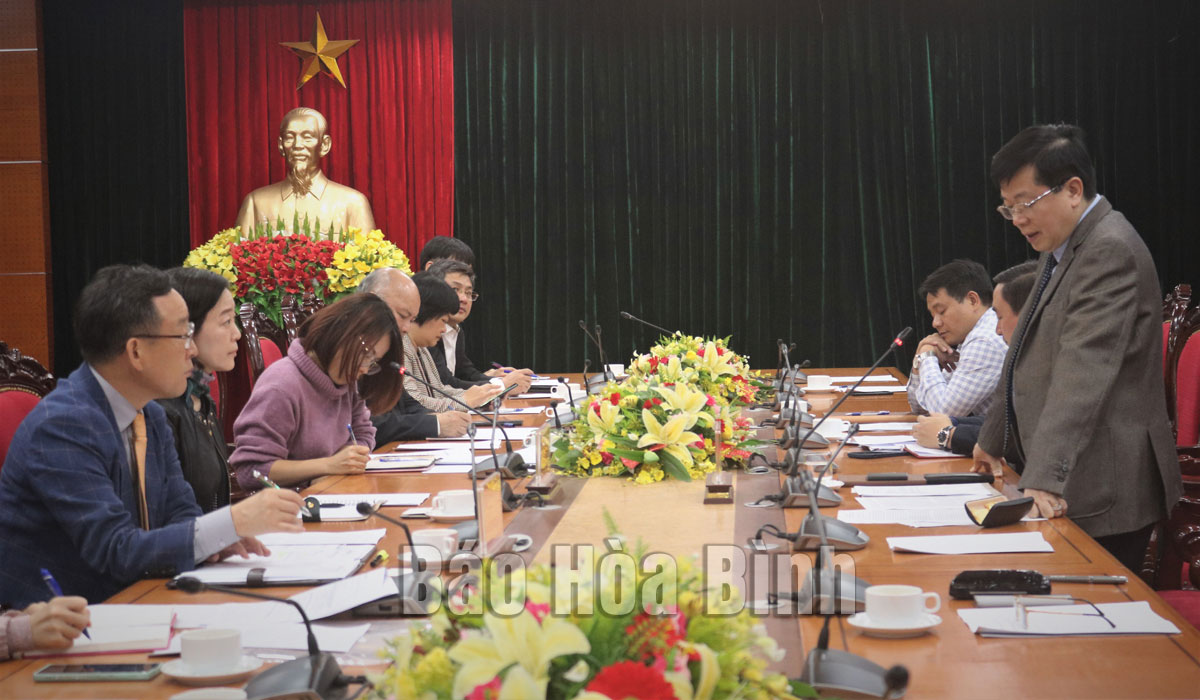
(HBO) - On December 13 afternoon, Nguyen Van Chuong, Vice Chairman of the Hoa Binh provincial People's Committee, and leaders of several departments and sectors had a working session with a delegation of the Republic of Korea (RoK)’s Ministry of the Interior and Safety. The delegation comprised of Eom Hyun-sook, Director of the Division of International Cooperation on Good Management; and Lee Hong-seok, Counselor for Internal Affairs and Public Administration at the RoK Embassy in Vietnam.

Vice Chairman of the provincial People's Committee
Nguyen Van Chuong speaks at the session.
Welcoming the Korean ministry delegation, Vice Chairman
Chuong informed them of the potential, advantages and outstanding
socio-economic development results of the locality. He emphasised that Hoa Binh
has a good relationship with the RoK in general and several Korean localities
in particular.
The official expressed his hope that the delegation will
share experience in building local administration with Hoa Binh.
Eom Hyun-sook said that during this working visit, the
delegation plans to exchange views on new areas of administrative management
and local administration, and expressed his hope that in the coming time, the
two sides will share information and support and cooperate with each other in
the field of local administration management, fire safety and fighting.
A leader of the provincial Department of Home Affairs also
briefed the guests on local government management in Hoa Binh province.
At the session, the two sides also discussed to find
similarities to orient the content of cooperation in the coming time such as
public administration, support for the building of the capacity of local
authorities, and personnel training to better serve local people.
Hoa Binh province is undergoing a dynamic transformation amid Vietnam’s national digital transition. Building on Poliburo’s Resolution No. 57-NQ/TW on breakthroughs in science, technology, innovation, and national digital transformation, the province has rolled out a wide range of practical action plans. A standout initiative is the "Digital Literacy for All” movement, an effort to ensure that no one is left behind in the digital era.
Hoa Binh province is undergoing a dynamic transformation in the wake of the national digital transformation movement. Building on Resolution No. 57-NQ/TW of the Politburo on breakthroughs in science, technology, innovation, and national digital transformation, the province has implemented a wide range of practical action plans. A standout initiative is the "Digital Literacy for All” movement ambitious effort to ensure that no one is left behind in the digital age.
With a spirit of unity and proactive problem-solving, the Party Committee, the government and the people of Dong Lai Commune (Tan Lac District) have made great strides in implementing the resolutions of the 24th Party Congress of the commune for the 2020 - 2025 term. Focusing on leadership and practical actions, the commune has brought the Party’s resolutions into daily life, creating strong impacts and pushing the local development forward.
Amid the nationwide push for digital transformation, young people in Hoa Binh Province are stepping up as dynamic pioneers, applying technology to enhance Youth Union operations and expand the reach of youth-led initiatives. Through creativity and adaptability, Youth Union organizations at all levels have introduced a series of practical solutions, contributing to modern governance and community development.
In recent years, An Nghia commune, located in Lac Son district, has stepped up administrative reform, focusing on improving the quality and efficiency of its single-window service unit for receiving and processing administrative procedures. These improvements have helped create favourable conditions for local residents and organisations to handle administrative procedures, contributing to the commune’s broader socio-economic development.
The Prime Minister-approved master plan to develop the multi-use value of forests ecosystems through 2030, with a vision to 2050, aims to improve the management and sustainable use of forest resources, create jobs, increase incomes, and improve the living standards of ethnic minorities, people in mountainous and remote areas, forest workers and those living near forests.



